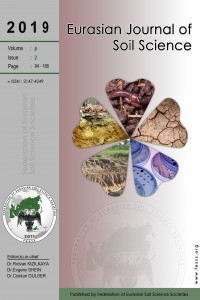
Eurasian Journal of Soil Science
Yazarlar: Hanuman Singh JATAV, Satish Kumar SİNGH, Surendra Singh JATAV, Vishnu D. RAJPUT, Svetlana SUSHKOVA
Konular:Fen
DOI:10.18393/ejss.880677
Anahtar Kelimeler:Heavy metals,Nutrient status,Microbial community,Organic matter,Sewage treatment plants
Özet: A field experiment was conducted to find out the effect of the conjoint application of sewage sludge (SS) and fertilizers on the yield of rice-wheat cropping system using a randomized block design. The grain yield ranged between 24.99 ± 4.24 to 66.32 ± 2.58 q ha-1 and 22.50 ± 0.55 to 50.37 ± 1.07 q ha-1 in Ist year grown rice and wheat, respectively. Among all the treatments, T3 (100% recommended dose of fertilizer (RDF) + 30 t ha-1 SS) recorded a significantly highest grain yield of rice crop (66.32 and 63.37 q ha-1) and wheat crop (50.37 and 46.91 q ha-1) during 2015-16 and 2016-17 years, respectively. The straw yield in Ist rice and Ist wheat ranged between 55.11 to 81.22 q ha-1 and 35.86 to 56.62 q ha-1, whereas straw yield in IInd rice and IInd wheat were noticed between 48.42 to 79.31 q ha-1 and 30.45 to 52.32 q ha-1, respectively. The finding clearly shows that the application of SS significantly enhances the yield of rice-wheat crops, and could be an option to a sustainable use of SS. However, the precautionary measure should be followed before use. In addition, the application of SS also indicates the improvement in soil health and sustainability.